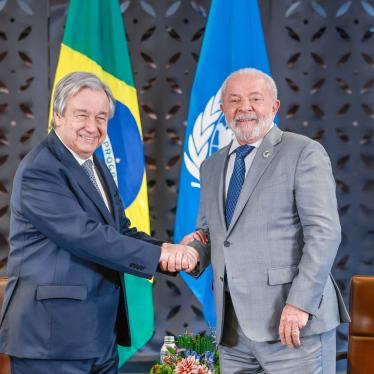(São Paulo) – Brazil should urgently address the chronic problem of police abuse and impunity by ensuring that prosecutors lead investigations and that those investigations comply with international standards, Human Rights Watch said today in a letter to the attorney general, Augusto Aras.
Police killed more than 6,400 people in 2022, according to the nonprofit Brazilian Forum of Public Security, which compiles the data from official sources at the state level. In less than a month between the end of July and August 2023, at least 62 people were killed during police operations in Bahia, Rio, and São Paulo states alone.
“The deadly law enforcement operations in recent months underscore the urgent need to improve investigations into police conduct,” said Maria Laura Canineu, Brazil director at Human Rights Watch. “Prosecutors should carry out effective oversight of the police by leading investigations into police killings and cases of suspected police abuse, instead of relying on the police to investigate themselves.”
While some police killings are in self defense, many result from illegal use of force that goes largely unpunished. Currently, civil police carry out investigations into police abuses. This raises serious questions of impartiality as civil police investigate their own personnel, as well as military police personnel with whom they may have worked in other cases.
In 2017, the Inter-American Court of Human Rights ordered Brazil to ensure that investigations of police killings, torture, or sexual violence are “entrusted to an independent body, distinct from the police force involved in the incident.” In 2021, the Court said that both the Brazilian state and representatives of victims agreed that the prosecutor’s office is that independent body. Brazil has an obligation to comply with the Court’s decisions.
On March 10, the National Council of Prosecutors, which oversees the work of federal and state prosecutors, established a working group to draft a resolution to guide prosecutors’ investigations into cases of death, torture, and sexual violence “in the context of police operations.” The resolution should make clear that prosecutors have not only authority, but the obligation to conduct their own investigations into all cases of police abuse, Human Rights Watch said.
Human Rights Watch has documented scores of cases in which police officers intimidated witnesses, or manipulated and destroyed evidence, including by taking bodies to hospitals falsely claiming the victims were still alive and removing the victim’s clothes; as well as cases in which civil police failed to conduct adequate investigations into police killings, for instance by not visiting the crime scene.
The new resolution should include robust requirements for conducting the investigations, Human Rights Watch said. Prosecutors have often failed to meet their obligation to ensure civil and military police abide by the law and that investigations into abuses are prompt, thorough, and independent.
Crucially, the investigations should observe international standards, in particular the UN Manual on the Effective Prevention and Investigation of Extra-legal, Arbitrary and Summary Executions, known as the Minnesota Protocol. The protocol provides detailed guidelines to ensure investigations include adequate photographs, descriptions of external wounds and their trajectory, and detection of firearm discharge residue on the hands of victims, among other necessary steps.
The resolution should also include steps that state attorneys general should take, such as employing full-time forensic experts who are independent of the civil police; as well as establishing well-resourced specialized units of prosecutors dedicated to developing and enforcing police protocols to prevent abuses, and carrying out the resulting investigations and prosecutions. State attorneys general should also establish a system of shifts so that on-duty prosecutors and forensic experts respond in real time to complaints of police misconduct, allowing them to intervene immediately and prevent further abuses during ongoing police operations.
The resolution should also call on prosecutors to take statements from victims, families, and witnesses, some of whom may fear that providing statements to police investigators could put them at risk. The resolution should also allow victims and relatives to obtain key information about the investigations, within the bounds of the law, and require states to create accessible complaint mechanisms to report police misconduct, including anonymously.
Human Rights Watch has found that police abuse takes a heavy toll not only on the victims and their families, but also on the police force itself. Prosecutors should work with police forces to assess the working conditions and address the high levels of stress; promote the use of body cameras to help shield other officers from pressure by peers and protect them from false accusations; as well as to address systemic racism in the context of law enforcement.
They should also review state police protocols, and work with police command and secretaries of public security to enact guidelines to prevent that police officers conduct retaliation operations after the killing of a police officer.
Once the working group drafts the resolution, it will open a period of comment on the text by prosecutors’ offices around the country. The National Council of Prosecutors will need to approve or reject the final resolution. In the meantime, the president of the Council may change, as the term of the current attorney general ends on September 26. President Luis Inácio Lula da Silva will have to either select a new attorney general or renew the mandate of the current one. Brazil’s Senate needs to approve the selection.
“Prosecutors have a key role to play in breaking a cycle of violence and impunity by ensuring adequate police oversight and independent investigations into abuses,” Canineu said. “For that to happen, whoever is appointed as attorney general should not only promote the adoption of a strong resolution, but ensure that state attorneys general and state prosecutors implement it.”






